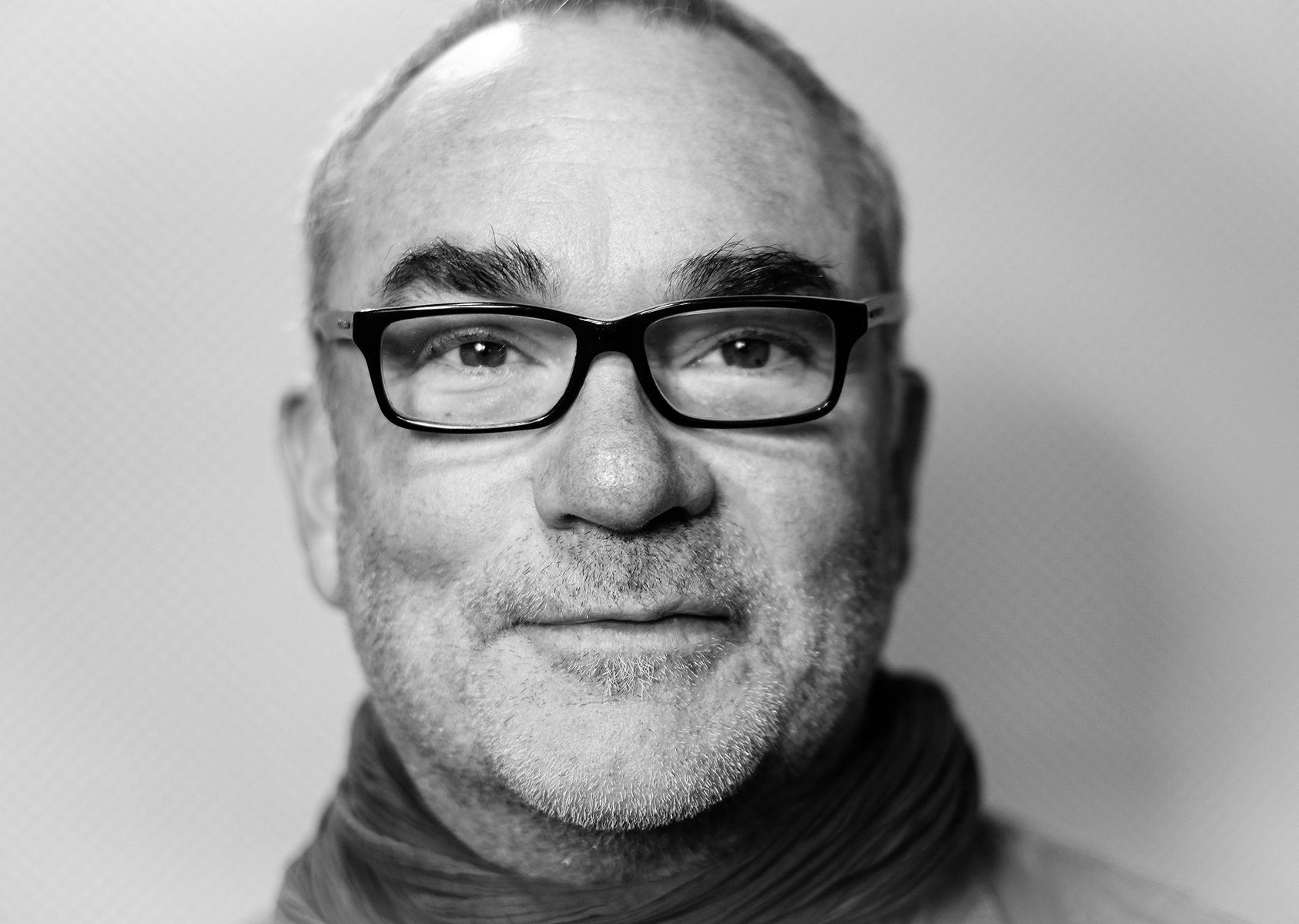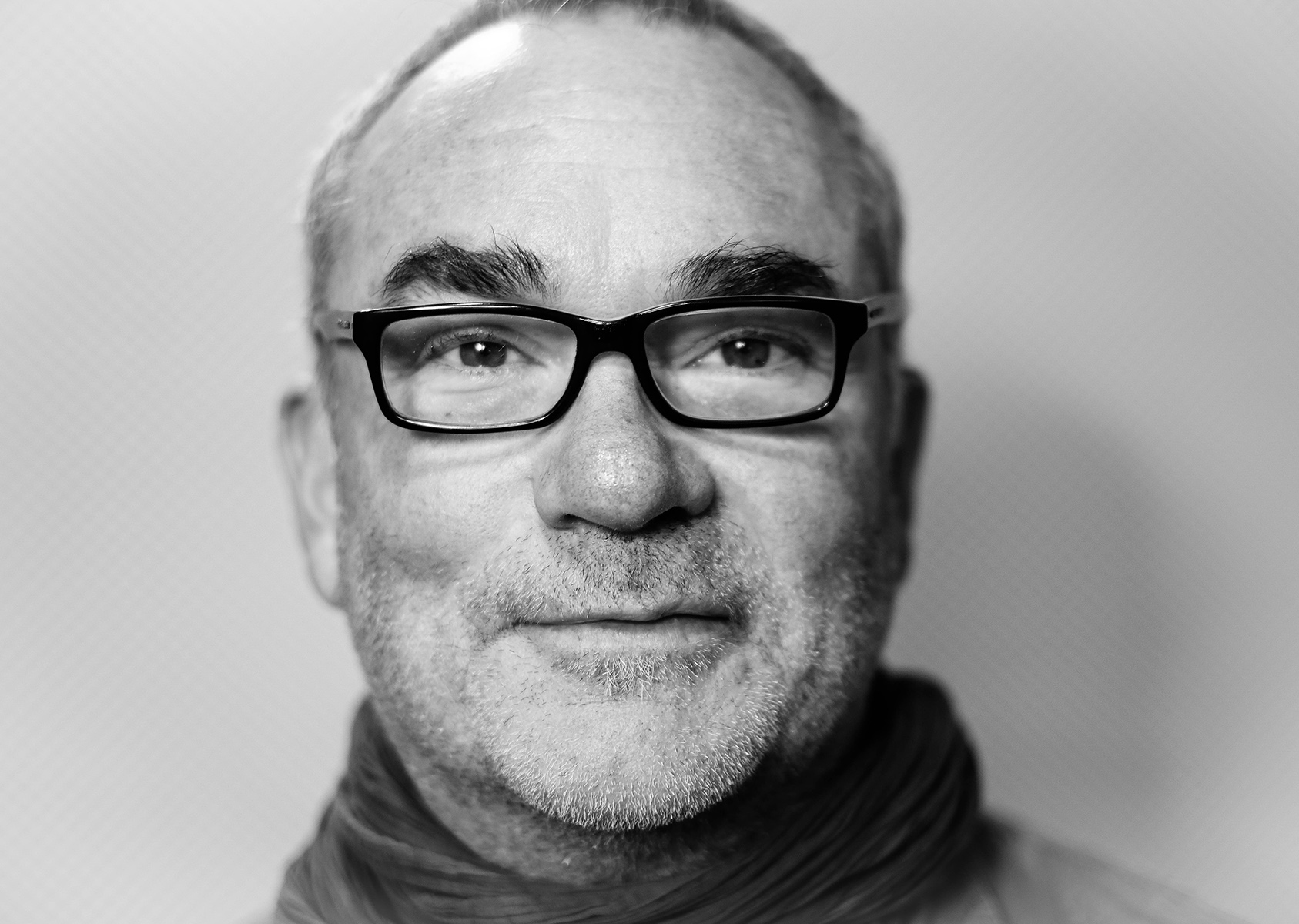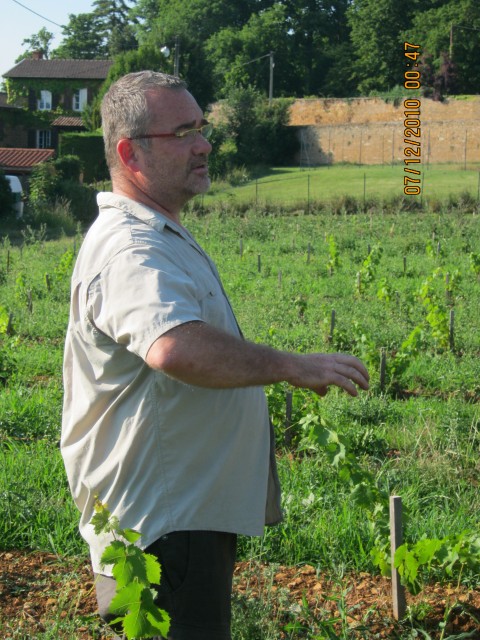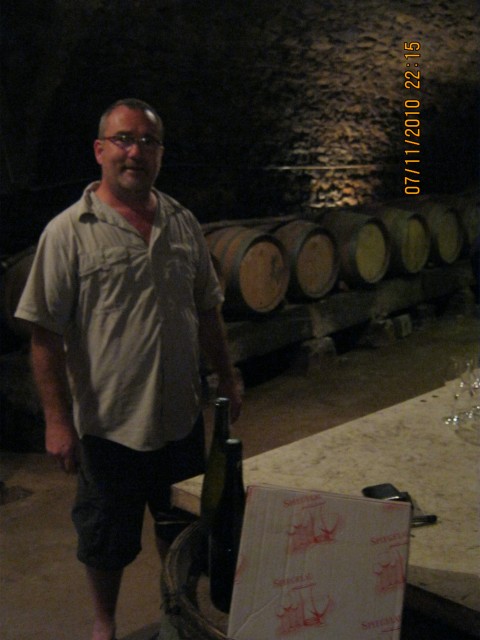
Winemaker Éric Texier made the dramatic leap from nuclear engineer to winemaker in the early 1990s. With no family background in wine, through reading, studying, and visiting traditional winemakers and sustainable farms around the world, he developed a passion for wine. His winemaking is very old, traditional school, inspired by an older generation of Rhône producers.
Éric Texier speaks to Grape Collective about his curious journey and his passion and focus for sustainability and terroir.
 Christopher Barnes: Éric, Can you describe your journey as a winemaker? I understand that you were initially a nuclear engineer, and then you went into winemaking. It’s a most unusual career change.
Christopher Barnes: Éric, Can you describe your journey as a winemaker? I understand that you were initially a nuclear engineer, and then you went into winemaking. It’s a most unusual career change.
Éric Texier: Yes and no. When you look carefully now, especially in the so-called natural wine movement, it’s interesting to note that many people were not into farming or winemaking at the beginning of their career. So perhaps I was a bit ahead of my time, but now it's quite common. And, in fact, it was just after 10 or 12 years working as a nuclear engineer that I became fed up. I wanted to do something different.
Natural wine is a very divisive concept in the wine world. Some people are very passionate about it, and there are others who are set against it. What is your opinion of the whole concept of natural wine?
No, for me as a traditionalist, as a traditional natural winemaker, it's just going back to what was done, let's say, before the industrialization of the food industry and wine producing. So, I make wine and I farm wine the way it was done in the '50s or even in the '60s or '70s in Ardèche. That's it! Nothing more, nothing less! I don't see why the concept is so difficult to understand. It means that I'm just doing what has been done for 2,000 years in France.
There's a lot of different variations of natural wine. For example, there’s biodynamics, there's organics, however you don't use any of those labels, do you?
I'm organic certified because I think, in this world of a lot of artifice, how do you say, alternative facts, people need to know where exactly we are situated. So I'm organic certified and I've been growing organically for roughly the past 17 years. But for me this was not enough. Firstly, organic until recently didn't mean anything about the winemaking, like biodynamics by the way. It's all about the farming. At the time there was no specific standards for winemaking organic or biodynamics, and then also I discovered very quickly that organic was not enough. So I paid attention to something called "L'agriculture de conservation" in French, which is very close to the theories of a Japanese theorist called Masanobu Fukuoka, a natural agriculture theory, which means that we try to work with the soil more than the vines or the fruit. So my main focus in terms of time and energy is dedicated to the soil.
In biodynamics, they're very focused on using animal manure as part of the main recipe for farming biodynamically. You don't use animal manure in your farming, do you?
No, this is also part of the agricultural concept of agriculture de conservation. For example, under the conditions we have in vineyards in Ardèche or in Drôme around the 45th parallel, you don't need anything more than air and photosynthesis to contribute enough organic matter to the soil to get a proper around 45 hectoliters per hectare which means around 6,000 bottles of wine out of one hectare. Therefore, there is no need for anything else, so that's why I'm not adding anything— either organic and vegetal, or organic and animal.
 In terms of yield, I read somewhere that you said some of these artisan winemakers that are really reducing their yields to a very, very low level are being foolish. Why is that?
In terms of yield, I read somewhere that you said some of these artisan winemakers that are really reducing their yields to a very, very low level are being foolish. Why is that?
Well, there is a natural yield. Again, I get about three feet of rainfall each year and almost six months of plain sun. My soil is quite fertile, so there is no chance, without my extremely powerful intervention to get lower than let's say 25 to 30 hectoliters to a hectare, if things are going wrong. If everything is going right, I get around 45 hectoliters a hectare. Whatever my will is, then if I really want to make 20, on a normal year, if everything is going okay, I have to fight against the vines, I have to fight against nature to go for those low yields. Is this natural? For me, no, so I'm not going to fight. I have plenty of problems in my life. I'm not going to fight against my vines, no! So that's why I admit that I'm producing a lot of wine, and if I get a lot of wine from my vines I'm super happy, because my vines seems to be happy too.
Talk a little bit about the use of copper and sulfur.
Well, they are two different things. Vinifera has no genetic defense against the mildew and odium or powdery mildew because these diseases were brought from the American continent about 200 years ago. Vinifera is not equipped, genetically speaking, to fight against this disease. So, if I want to be able to get some fruit and make a decent living for my family, I have no option. Well, if it's vinifera, again, then we have other options. These options might be what we call Piwi in Europe which is hybrids of vinifera and something else, like hybrids like a lot of other grapes, especially coming from America again. These might be resistant to disease and they don't need any spray. But so far, as a terroir and kind of old-school winemaker, I'm still using the local grapes of my area. So mainly Syrah for the reds and Marsanne, Roussanne for the whites; they are not resistant to those diseases, and they are not resistant to phylloxera either.
The two things we have to do, most of the time, is grafting vines to avoid phylloxera over root stalks that are resistant to phylloxera, and use copper and sulfur to fight against the mildew and the powdery mildew, which are—copper and sulfites in this case are fungicide. Of course, they are bad, they are bad for my soil because, especially on the top soil, fungus are extremely important. And since I'm using fungicide against mildew and odium, these fungicides are going to kill my fungus on the topsoil. So obviously, this is not a good solution, but so far, we have no option if we want to get a decent crop again. That's why I'm using it.
It's another story for the wine. I try not to use anything when I make wine. Again, as it has been done forever in Europe. No additives unless I need them, or unless my customers need it. So this is only about sulfur and modern sulfur. It's SO2, which is l'anhydride sulfureux sulfur in French, which is a powerful bactericide and antioxidant that I won't need during winemaking or aging, but I could use if a wine is weak at bottling to ensure that the wine will be what I decide it should be when I bottle it, and it arrives in the glass of the consumer.
Éric, you describe the northern Rhône as equal in many ways to the grand cru vineyards of Burgundy. Why do we create these value statements with wine, and why is one area better than the other?
Well, it's beyond me. That's the result of history. Again, we are just the inheritors of 60, 70 generations of growers that were a lot smarter than us. Remember, they didn't have the technology we have now, so to be extremely efficient, they had to be extremely smart watching which area, which exposure, which place, which soil, where was the tiny wind in the morning? So over the years, they did an incredible job finding the best places to grow a specific grape. In the northern Rhône, it is Syrah. It might not be a very old history, though. Maybe 500 or 600 years, it's not very clear right now. But, probably not as long as Pinot Noir has been growing in Burgundy, but believe me, whatever you try, even if you think you're extremely smart, you won't find a much better place to grow Syrah than the slopes of Hermitage or Côte Rôtie.
One of the fascinating things about terroir is that you can be a billionaire, you can hire thousands of extremely highly skilled people for winemaking or for farming. You can't replace 2,000 years of experience. So yes, for Syrah at least, I think the northern Rhône is one of these very special places where you can achieve an extremely specific wine from the same grape, Syrah, modeled on Burgundy you can achieve extremely different wines with one grape, Pinot Noir or Chardonnay, from different terroirs.
 Éric, Brézème is located in the northern Rhône. What is so special about your vineyards there?
Éric, Brézème is located in the northern Rhône. What is so special about your vineyards there?
There is one thing that is extremely special. We are in the northern Rhône, north of Montelimar, which means that the Mediterranean influence is almost zero. It's a continental climate, in many ways, closer to what we find in Beaujolais or in Savoie and what we find in Provence.It's also the home of Syrah. Syrah was created in this area as a cross between Dureza and Mondeuse Blanche. Dureza being local from Ardèche, Mondeuse Blanche being from Savoie. Brézème is very unique because it's one of the very few places in the northern Rhône where you find limestone soil. Many of the top vineyards in the northern Rhône, let's say Côte Rôtie, Hermitage, Cornas, most of Saint-Joseph, are either granite or schist. So, poor soils in terms of clay, generally low pH, extremely warm soils, that keep the heat they get during the day, and they keep it during the night. Brézème is the exact opposite. It’s full of limestone and clay, so it's an extremely cool soil. To give you an example, which is quite fascinating, it's eight kilometers between the two, so 12 miles or something like that. In 2015 we measured 30 centimeters below the surface—one foot below the surface at midnight after a very hot day. In Saint-Julien, in the granite, it was 30 Celsius. In Brézème, only eight kilometers away, it was 18.
Which means that in terms of the differences, it's like being in Burgundy for Brézème, and being in Spain for Saint-Julien, with only eight kilometers between the two. So that makes Brézème extremely special because we get this incredibly cool temperature at night that you won't find in any other place in the northern Rhône. It is expressed in the wines because these wines are, like we say in France, very "tendu," tense with high acid, very mineral, extremely terroir driven.
Éric, you make wine in a very traditional manner. Are there certain instances when you would consider changing your approach, or look at new technologies or new methods of making wine? Have you been very consistent in your winemaking over the years?
No, I haven't been very consistent. In my first five years, I tried many, many things. Again, as a beginner, as someone who was trained as an engineer, I thought I might be smarter than most of the farmers. And obviously, after five years, I think I'm not too stupid, and then I noticed that the best way to make wine was the way it has always been made. So, now I'm extremely consistent because I'm back to what people have done for centuries, nothing less, nothing more.
You make wine in the northern Rhône but you also make wine using grapes from Chateauneuf-du-Pape. We've heard from other winemakers that global warming has had a major impact on that area. Have you noticed any changes there? Also is that an issuein the northern Rhône?
There are issues mostly on the vines, more than in the wines in the northern Rhône. Today I think we are getting extremely high alcohol, sweet extracted wines in the northern Rhône, it'sdue more to the will of the makers, winemakers, farmers, than to global warming. In Chateauneuf, it's another story. Chateauneuf, for the past 15 years, yes, we’ve noticed that the vines are behaving in a very new way, and the result is that we have a very late, phenolic ripeness with very early sugar or alcohol ripeness. Which means that, it's almost impossible to make a Chateauneuf-du-Pape at 13% of alcohol anymore, if you want to get ripe grapes. And if you don't get ripe grapes, then you don't get the traditional expression of Grenache in Chateauneuf-du-Pape. Also, in Chateauneuf-du-Pape, I’ve have noticed a lot of Syrah all over the place.
Which is strange. if you think about it carefully, global warming would have done the opposite. Instead of bringing northern grapes down to the south, the smart move would have been to bring southern grapes to the north. Why did they use or plant tons of Syrah? Because of the influence of a few critics, especially Robert Parker, for big extracted dark wines, and Syrah is your friend. As soon as you want big, extracted and black, you need Syrah or Grenache. But honestly, as a Chateauneuf-du-Pape lover, there are wines like Rayas that have been made since the beginning, mostly with Grenache that has no color, that are extremely lightly extracted but they are amazingly good and expressing something absolutely unique, a lot better than any Syrah-based Chateauneuf-du-Pape that I can think of.
So yes, we have a problem with phenolic ripeness coming too late compared to the sugar ripeness, so we have to find a way to train these Grenache vines differently. It might take a while— one, two, three generations but nothing unusual again. If you look at history, they had to face warmings, they had to face a glacial era at one point, and they had to adapt. If you study carefully historically, the way they were training vines at one point was absolutely not the way they were training the same vine at the same place 50 years ago. So I think we need a bit of time to figure out how to manage it, but it's not impossible.
Éric, are there other winemakers that have influenced you in your quest to make pure, traditional wines?
Winemakers, no I don't think so. But farmers, definitely yes. Again, winemaking is winemaking and it's almost nothing in a life of a farmer or winemaker. I'm not doing anything special, like I said before, I'm just doing what historically has been done. Then, if we talk in terms of farming and in terms of expressing a terroir, in the northern Rhône especially, yes, I can think of Marcel Juge at Cornas, Noel Verset at Cornas, Marius Gentaz-Dervieux at Côte Rôtie, even Gerard Chave at Hermitage. All these people used to make wines that I admire a lot for their ability to express a unique, with a very extreme precision, specific terroir on a specific place. So these people I admire a lot, yes.
Outside of the Rhône, what wines do you enjoy drinking yourself?
Everything. Almost. As soon as they express something that I cannot get at my place with my grapes, I'm okay; I drink wines from all over the world. I enjoy very much drinking them when I'm abroad, so when I'm in the US on the West Coast, I will mostly drink West Coast wines. Again, as soon as they express something other than the brand of yeast, the oenologist that consults, the cooperage who makes the tonneau, because this is not what I want. I want pure juice wine, and yes, I enjoy everything.
Éric, I understand you do not plow your soils. Why?
It's not strictly that I don't plow. Let's say that I avoid plowing, and each time I have to plow for whatever reason, I know that I'm doing harm to the soil. I will have to correct it afterwards. As soon as you know that you're doing something bad to your soil, you're not going to do it on a regular basis, especially if you don't need to. So, most of the time, I will plow once a year, maybe twice a year, but I will try to avoid 100% plowing between the rows.
What's the idea here? The agriculture de conservation or the natural agriculture from Masanobu Fukuoka, or permaculture from Bill Mollison, all rely on the same concept. Soil doesn't need human intervention to work. Obviously, the best soil you can find is primary soil, untouched since the beginning of creation, and why is that?It's because very specific layers in the soil are working extremely efficiently, one with the other one. Also you don’t have microorganisms, but organisms, especially worms, who will turn things down and then up at the right time. All this energy, organic energy, is available for plants to grow.
That's what we are trying to reproduce in our soils, in our vineyard. Once one square foot of dirt, I mean naked dirt, is exposed to the light, it is one square foot lost. It’s totally useless for growing vines, or fruit or for vegetables.It's useless.Of course, I'm going to try to avoid that as much as possible, and I'm going to try to leave the soil untouched to make it work as efficiently as possible. And each time I touch something, I know it's going to be a disaster because human beings have absolutely no idea how the soil works. I'm convinced of it, which makes me apart from the biodynamics. Biodynamics is based on the Steiner hypothesis and I think that they have a clue about how things are working. I think we don't know. So far, the less I touch, the better it is for the soil. This is what I believe.














